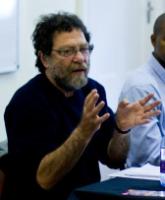
The Humanities Charter, said Professor Ari Sitas, “is asking us to construct the future with the best of what we have in the past”, and for this to happen, a comprehensive historical account of the humanities and higher education in South Africa is required.
In a talk entitled “Reflections on the Charter's Politics of Knowledge”, Prof Sitas, highlighted the current lack of historical context of South African higher education systems and Humanities as potentially problematic in attempting to consider the future of higher education institutions in South Africa.
“There is no proper agreed upon historical account, which is important to start the process of analysis. It is absolutely necessary for theorisation otherwise we will be forever trapped in 1652 unless this happens and it happens properly,” he said, adding that thick descriptions of the history of the Humanities and higher education institutions are particularly important.
Ari Sitas is a Professor of Sociology at the University of Cape Town and Director of the Ministerial Task Team that produced the Charter for the Humanities and Social Sciences. He recently critiqued the paper’s contributions and significance to the post-apartheid educational system during a colloquium held at Rhodes.
The report, which was commissioned by the Minister of Higher Education, makes wide-ranging recommendations for the future state of the humanities in the South African higher education system.
Suggesting a revitalisation of South African heritage sites as a necessary process in establishing a sense of history and navigating the humanities in a positive direction, Prof Sitas highlighted the importance of establishing a sense of heritage and culture in South Africa.
“Various heritage sites that have been recognised by UNESCO as being important for the cosmos have been reduced to tourism sites. It is impossible to reconstruct anything without those functioning as hubs of knowledge production, education, research and so on,” he said.
In the same vain, if the humanities and social sciences are going to progress, an aberration from the tendency to presume an emancipatory nature of the humanities is required. “There’s a tendency to assume that the humanities collapses into a type of humanism. There is nothing emancipatory about it,” said Prof Sitas.
In considering the future of the humanities in South Africa, Prof Sitas said academics should not be too hard on themselves with regards to the numbers of registered masters and PhD students, because South Africa is new in the production of postgraduate students.
“We should be visionary enough to look at certain patterns that have been with us, the tendencies in the humanities and ask ourselves whether South Africa is going to follow the trajectory of urbanisation?” The implications of this would be vast, according to Prof Sitas, who said expanded urbanisation may be experienced as “enormous conglomerations of people move towards megacities”. Predicting an increase in conflict between humans and other sentient beings over the control of the planet, Prof Sitas said this would constitute the driving force behind most research.
Highlighting technologies, genetic engineering and eco-technology as potential stressors, he said there would also be increased pressure for intercultural competence, with the “world going to be even more globalised than we worry about”.
Worrying trends of drug and alcohol abuse, mortality rates and extreme forms of violence show frightening tendencies in South Africa, Prof Sitas said however there is great potential too.
For South Arica, the potential for biodiversity and cultural diversity are broad, said Prof Sitas, who highlighted the notion of social insecurity as being popular in sociology. “South Africa has incredible opportunities for biodiversity and cultural diversity, the development of languages and human migration, and all these areas might be a great plus. The fact that there is an economy that has a chance of surviving Brazil, China and India in the future is also important,” he said.
South Africa’s past may also stand the country in good stead going forward, hailing from a democratic imaginary, where the importance of education is acknowledged. “We are levellers, and we must stop elitism from happening. This is an important heritage to defend and we must move away from labour exploitation,” he added.
In terms of whether an intervention in the humanities is necessary, as has been suggested recently, Prof Sitas said he believes more South African-based PhDs are necessary for the future, involving a shift away from the contemporary majority of African PhD students. These studies need to be conducted in important areas within the Humanities, unlike the majority of PhDs today that are Science based.
Prof Sitas was speaking during the South African Humanities Deans Association colloquium, which was hosted by Rhodes University.
The Charter for the Humanities and Social Sciences is available at http://www.charterforhumanities.co.za/
By Sarah-Jane Bradfield
Photo by Adrian Frost
